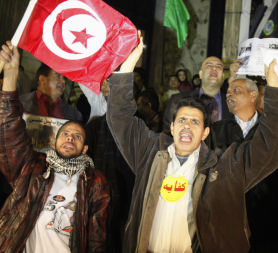The Domino Effect – will unrest infect the Arab world?
Leaders across the Arab world are living in fear that the unrest that triggered the collapse of the Tunisian government could head their way, writes Felicity Spector.
Food riots in Algeria and protests over economic hardship in Jordan – where the the Muslim Brotherhood warned that price rises could lead to an “unprecedented explosion”, along the North African model. Protestors setting themselves on fire in Algeria – apparently in despair over their bleak economic future – four men dying in the last week alone. And in Egypt today, another man set himself ablaze over poor living standards.
It all seems like a grim echo of events in Tunisia, where 26-year-old jobless graduate Mohamed Bouazizi set fire to himself last month, after he was prevented from selling vegetables to make a living. When he died from his injuries, it triggered mass protests over youth unemployment, soaring prices and poverty – and a political leadership that ignored their concerns.
Mass protests became a mass revolt – and Tunisia’s authoritarian leader fled into exile, his government collapsing around him.
It’s got leaders across the Arab world expressing alarm – and calling for calm. In Iran, the foreign ministry said it was ‘worried’ about the Tunisian events – while the parliament speaker Ali Larijani warned that “the behaviour of America and some western countries is ridiculous…They are the root cause of dictatorship and pressure in Tunisia and now they pretend to sympathise with the Tunisian nation”.
While the Libyan leader Muammar Gaddafi was more alarmist. “Tunisia now lives in fear”, he said. “Families could be raided and slaughtered in their bedrooms and the citizens in the street killed as if it was the Bolshevik or the American revolution.”

Even for the most repressive regimes, it’s been hard to stop the images of Tunisia’s uprising from being broadcast across the world, not just on cable television, but amplified by the internet, especially social networking sites. Tunisia’s educated middle class is highly adept at using sites like Facebook and Twitter to spread the word about protests and rally others to their cause.
But the influence of the net goes further, despite official attempts to contain it. Several Facebook pages in Egypt have called for mass street protests later this month, calling it a “Day of Revolution against torture, poverty, corruption and unemployment”. Others have simply demanded that President Hosni Mubarak start packing his bags, while on Twitter, a contributor claims: “All countries in the Arab World (are) sitting on a volcano that might erupt anytime!”
There are similar calls in the United Arab Emirates, where one online forum claims: “Tyrants don’t last forever… This is a clear message to every dictatorial regime that rules by iron and fire”.
“Tyrants don’t last forever… This is a clear message to every dictatorial regime that rules by iron and fire”. Online forum comment in UAE
Eager to avoid the fate of Tunisia’s exiled president Ben Ali, officials in neighbouring countries have already begun taking action – Jordan and Libya have started reducing some food prices, while the head of the Algerian president’s party, Abdelaziz Belkhadem, told a newspaper: “A wise man must take what happened in Tunisia as a lesson. The best protection and the best legitimacy are always the ones provided by the people.”
Algeria has now reduced taxes on sugar and cooking oil in a bid to curb popular anger over living costs.
But the idea that Tunisia could simply set off a wave of similar revolts across the Arab world might be too simplistic. In the Telegraph, Claire Spencer from Chatham House describes its situation as somewhat unique. Tunisia, she argues, has been forced to “combine trade liberalisation and greater openness to the outside world out of necessity”, with no substantial oil or gas exports to rely on.
But she goes on to warn that Tunisia’s structural problems are mirrored elsewhere, not least “the failing of the pact between the rulers and the ruled; that in exchange for their exclusion from politics, the state will provide its citizens with jobs, services and economic growth. This has not happened, or has not happened fast enough for the region’s burgeoning population”, she writes.
And it’s the potential power of this youthful population, one which is becoming more confident, more vociferous and more willing to turn frustration into open protest, which is worrying autocratic leaders across the Arab world.
-
Latest news
-
FactCheck: Our analysis finds one in nine maternity services ‘double downgraded’ since 2022

-
FactCheck: Labour claims rail reforms would save taxpayer £2.2bn a year

-
‘Authentic Stupidity’: Ben Elton’s new show explores how idiotic human beings can be5m

-
Is Israel’s evacuation of Rafah the precursor to full scale invasion?3m

-
Eurovision: Non-binary artist wins for first time2m

-




